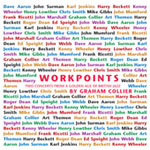Home » Jazz Articles » Album Review » Graham Collier: Workpoints
Graham Collier: Workpoints
The Workpoints suite appears on the first of two discs, recorded at a concert in Southampton, England with the Graham Collier Dozen. And what a lineup it was! Here were improvisers unafraid to fathom uncharted waters, the perfect cohorts for Collier, who left the middle open for the musicians to stamp the work in their own cast. "Deep Dark Blue Centre is the cynosure for development, individual paths converging in symmetry and then branching out again. Straight lines are prodded and probed, spirited spirals slip into the sea of calm, and not a note is out of sync.
The suite makes for an impressive body of improvisation. The first part emerges slowly through bass, drums, and trombone, and then Dave Aaron's alto rises and sings and weaves intricate patterns with drummer John Marshall fermenting the momentum. There is constant flux and shift, but not before a statement is stamped and emphasized either in the charge of the horns or the gentle solitude of a solo. The fascinating aspects of improvisation continue into the next part, percussion jiggling the rhythm for a Latin-tinged foray, a little bit of swing nestling in, a dip into bop, and of course the prime invention of free jazz that exults in the players' sheer artistry. As they move along, the blues jump in, as does the shimmy of New Orleans jazz. This many-faceted suite opens up to a kaleidoscope of wondrous colours.
The second disc features a concert in Middleheim, Belgium from August of 1975. Collier's sextet here is no less engaging than the larger group. They get right off the bat with "Little Ben, a rumbling ride that is fuelled by drummer John Webb before Ed Speight takes it on and bends some notes on the guitar. It's rock solid! "Darius is a four-part suite which Collier says was loosely written, but the second part was not played due to time constraints. The suite is an apt setting for the lissom lines that waft airily from the horns as the guitar permeates them with some melodic, luscious lines, Art Themen describes energetic swaths on the tenor saxophone, and Harry Beckett makes fleet jabs on the flugelhorn. Part Four is carried by Roger Dean on piano, the introspective air extended by the guitar and horns, form fissiparous before it coalesces into a whole.
"Clear Moon and "Mackerel Sky are part of a suite called "British Conversations. The former piece is a resplendent ballad, the main players being Themen and Speight. Speight provides a lightly modulated swing while Themen builds tension as he rides on top. "Mackerel Sky has a funky blues riff fired by the sense of urgency Speight injects as he rustles on into the sphere of rock music.
Time has not eroded the impact of this music.
Track Listing
Disc One: Deep Dark Blue Centre; The Barley Mow; Workpoints Part One; Workpoints Part Two; Workpoints Part Three; Workpoints Part Four. Disc Two: Little Ben; Under the Pier; Darius Part One; Darius Part Three; Darius Part Four; Darius Part One Reprise; Clear Moon; Mackarel Sky.
Personnel
Graham Collier
composer / conductorDisc One, Workpoints: Kenny Wheeler (trumpet, flugelhorn); Harry Beckett (trumpet, flugelhorn); Henry Lowther (trumpet, flugelhorn); Dave Aaron (alto, tenor and soprano saxophones, flute); John Surman (baritone and soprano saxophones, bass clarinet, piano); Karl Jenkins (baritone and soprano saxophones, oboe, piano); Chris Smith (trombone); Mike Gibbs (trombone); John Mumford (trombone, cowbell); Frank Ricotti (vibraphone, bongos); Graham Collier (bass, leader); John Marshall (drums). Disc Two, Live in Middleheim: Harry Beckett (trumpet, flugelhorn); Art Themen (tenor and soprano saxophone); Ed Speight (guitar); Roger Dean (piano, electric piano); Graham Collier (bass, leader); John Webb (drums).
Album information
Title: Workpoints | Year Released: 2005 | Record Label: Cuneiform Records
< Previous
Ottawa International Jazz Festival
Comments
About Graham Collier
Instrument: Composer / conductor
Related Articles | Albums | Photos | Similar ToTags
For the Love of Jazz
 All About Jazz has been a pillar of jazz since 1995, championing it as an art form and, more importantly, supporting the musicians who create it. Our enduring commitment has made "AAJ" one of the most culturally important websites of its kind, read by hundreds of thousands of fans, musicians and industry figures every month.
All About Jazz has been a pillar of jazz since 1995, championing it as an art form and, more importantly, supporting the musicians who create it. Our enduring commitment has made "AAJ" one of the most culturally important websites of its kind, read by hundreds of thousands of fans, musicians and industry figures every month.




















